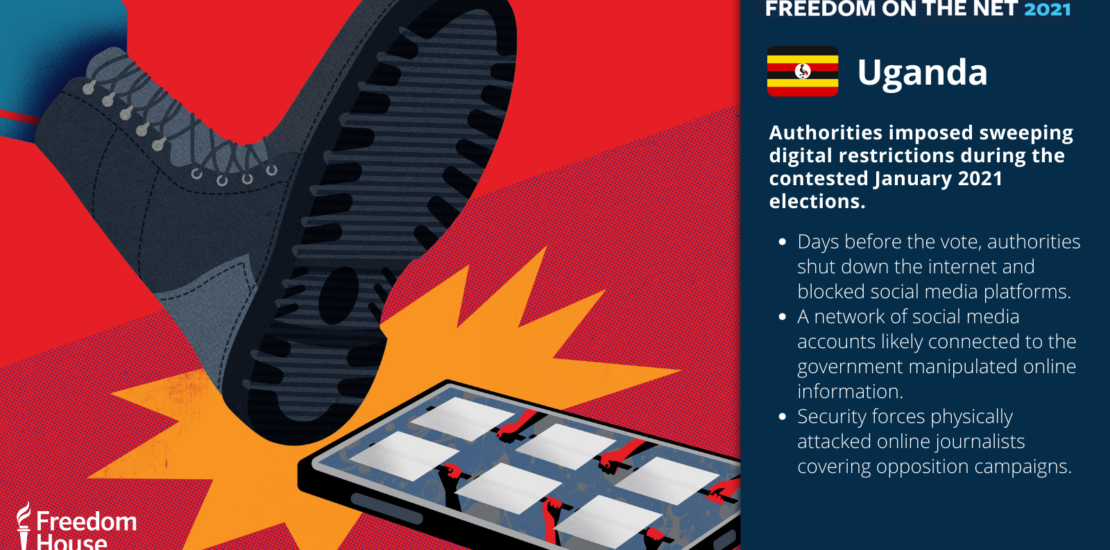- October 7, 2021
- Posted by: Joseph Kiwendo
- Category: Blog, News

PRESS RELEASE
New Report: Internet Freedom DECLINED in Uganda
Freedom on the Net 2021 finds that internet freedom in Uganda declined. Global findings include that while some democratic governments have made good-faith attempts to regulate the technology industry, state intervention in the digital sphere worldwide has contributed to the 11th consecutive year of global decline in internet freedom.
Governments around the world are increasingly asserting their authority over technology platforms, forcing businesses to comply with censorship and surveillance and contributing to an 11th consecutive year of global decline in internet freedom, according to Freedom on the Net 2021, the annual country-by-country assessment of internet freedom released on September 21 by Freedom House. The report also found that internet freedom in Uganda declined.
Global norms shifted dramatically toward greater state intervention in the digital sphere over the past year. Of the 70 states covered by Freedom on the Net 2021, 48 pursued legal or administrative action against technology companies. Some measures reflected legitimate attempts to mitigate online harms, rein in misuse of data, or end manipulative market practices. Many governments, however, proposed new policies that obliged businesses to remove content and share personal data with authorities, at great cost to free expression, privacy, and public accountability.
This change in the balance of power between companies and states has come amid a historic crackdown on freedom of expression online. In 56 countries, officials arrested or convicted people for their online speech. Governments suspended internet access in at least 20 countries, and 21 states blocked access to social media platforms, most often during times of political turmoil such as protests and elections. Authorities in at least 45 countries are suspected of obtaining sophisticated spyware or data-extraction technology from private vendors.
Internet freedom plummeted by 14 points in Myanmar—the largest annual decline ever recorded on Freedom on the Net’s 100-point scale—after the military refused to accept the results of the November 2020 general elections and launched a deadly coup in February 2021. Electoral disputes also led to major internet freedom declines in Belarus, where authoritarian incumbent Alyaksandr Lukashenka claimed victory in a fraudulent presidential election in August 2020, and Uganda, where authorities shut off the internet and blocked social media platforms during marred general elections in January 2021. In addition, officials in both Myanmar and Belarus sought to silence independent online media by shutting down news outlets and harassing, assaulting, and torturing online journalists.
Internet freedom in Uganda declined significantly during the coverage period, as the government imposed sweeping digital restrictions during the contested January 2021 general elections. As President Yoweri Museveni faced a serious challenge from opposition candidate Robert Kyagulanyi, better known as Bobi Wine, the government restricted internet connectivity, blocked social media platforms and circumvention tools, and sought to manipulate the online information environment. During the campaign period, security forces physically attacked online journalists covering opposition campaigns and continued to arrest people who criticized Museveni online.
KEY GLOBAL FINDINGS
- Global internet freedom declined for the 11th consecutive year. The greatest deteriorations were documented in Myanmar, Belarus, and Uganda, where state forces cracked down amid electoral and constitutional crises.
- Governments clashed with technology companies on users’ rights. Authorities in at least 48 countries pursued new rules for tech companies on content, data, and competition over the past year. With a few positive exceptions, the push to regulate the tech industry, which stems in some cases from genuine problems like online harassment and manipulative market practices, is being exploited to subdue free expression and gain greater access to private data.
- Free expression online is under unprecedented strain. More governments arrested users for nonviolent political, social, or religious speech than ever before. Officials suspended internet access in at least 20 countries, and 21 states blocked access to social media platforms. Authorities in at least 45 countries are suspected of obtaining sophisticated spyware or data-extraction technology from private vendors.
- State intervention must protect human rights online and preserve an open internet. The emancipatory power of the internet depends on its egalitarian nature. To counter digital authoritarianism, democracies should ensure that regulations enable users to express themselves freely, share information across borders, and hold the powerful to account.
KEY COUNTRY FINDINGS
- In April 2021, the government replaced the over-the-top (OTT) services tax, under which Ugandan internet users had to pay a daily fee to access social media sites, with a 12 percent tax on internet data, sharply raising the cost of internet access.
- The Uganda Communications Commission (UCC) ordered a five-day internet shutdown the day before polls closed in January 2021.
- Two days before the polls, the government blocked major social media platforms, as well as roughly a hundred circumvention tools; while most sites were unblocked after a month, Facebook remained inaccessible in Uganda as of August 2021.
- In January 2021, Facebook and Twitter removed a network of government-linked social media accounts seeking to shape online opinions in favor of President Museveni and the ruling NRM ahead of the elections.
- People who criticized the government and President Museveni on social media faced arrest and criminal charges during the coverage period, while online journalists covering opposition campaigns were attacked by security forces.
- New regulations were promulgated in March 2021 to implement the Data Protection and Privacy Act 2019, a key step in ensuring the protection of Ugandans’ data.
Freedom on the Net 2021 assesses internet freedom in 70 countries, accounting for 88 percent of internet users worldwide. The report focused on developments that occurred between June 2020 and May 2021. Global findings, detailed country reports, data on 21 internet freedom indicators, policy recommendations, and report contributors can be found at freedomonthenet.org. The Uganda country report can be found here.

